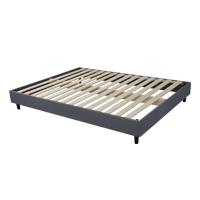Slumber Tips
How long after you eat should you sleep?
Is eating before bed bad for you?
As far as activities go, eating and sleeping might seem like they are worlds apart. One is active and in pursuit of energy, while the other is passive but essential for resting the brain and body. However, eating and sleeping are linked through many things, including timing and biological function. So how long after you eat should you sleep?
This article will take a look at the science of eating and sleeping, and how each works on the body — both independently and in tandem. We will also examine ways to hack your body to get the most out of these bodily functions. After all, they are both essential if you want to remain healthy and sane as you grow older.
Sleep Republic is here to give you inside knowledge about the science of sleep. We know that better sleep begins with a great mattress. Buy yours today with fast shipping and a guaranteed 150 night trial.
How long before bed should you stop eating?
This is an easy one; for optimal digestion, one should not go to bed more than 3 hours after eating a substantial meal. Your body needs this window of time to begin the digestion process. Going to bed any earlier can lead to discomfort in the form of indigestion and heartburn.
This is not a blanket ban on all food and drink after a certain time. Some people may eat dinner early and go to bed late. If hunger returns, you can still eat a light snack without having any digestive issues at night. Drinking water is also encouraged — but don’t drink too much, lest you wake up in the middle of the night with an urgent need to relieve yourself.
What is the relationship between food and sleep?
Your circadian rhythm — the body clock — runs every single cell in your body. It is synchronised with a range of environmental factors including exposure to daylight, weather, and changes in the timezone. The circadian rhythm dictates a range of biological functions including:
- Hormonal levels and changes
- Responses to medication
- Appetite and thirst
- Energy levels and sleepiness
To be specific about the relationship between food and sleep, we have to go deeper. Insulin — the hormone that regulates metabolism and glucose absorption — acts as a timing signal to cells throughout the body. When this is disrupted, the circadian rhythm is upended, leaving the whole body clock in complete disarray.

What are the dangers of eating too close to bedtime?
As we covered earlier, eating a hearty meal just before sleep can grant you a plethora of digestive issues. It’s also true that eating fatty, sugary, or caffeinated food and drink before bed will probably keep you in a restless state as the stimulants and sugars are absorbed by the body.
However, the dangers of eating too close to sleep go far beyond simply a few restless nights a week. Circadian disruption can have a range of adverse health effects for those experiencing long term changes to eating-sleeping patterns. These risks include:
- Metabolism disorders, like type-2 diabetes and obesity
- Sleep disorders, like chronic fatigue, insomnia, tiredness, decreased alertness, and memory problems
- Cardiovascular diseases like stroke and heart disease
- Cognitive decline and behavioural disorders leading to poor performance and stress
- Fertility problems as the hormonal patterns are disrupted
- Mood disorders, including irritability, anxiety, and depression
The sleep-deprived, long-distance travellers, and shift workers are at a greater risk than other segments of the population. However, the negative effects of a disjointed eat-sleep schedule can be mitigated with a bit of extra care.
What are some tips for the optimal eat-sleep schedule?
Meal timing and light exposure are imperative for promoting a steady circadian rhythm. Here are our top tips for making sure your body clock stays regular every day, and in any season:
- Adopt a regular eating and bedtime routine
- Try your best to avoid naps during the day
- Eat at least 3 hours before you plan to sleep
- Load up on serotonin-producing foods like low-fat dairy, apples, and grapes
- Avoid caffeine, sugar, alcohol, and nicotine close to bedtime
- Increase your daily exercise, but don’t exercise close to bedtime
- Manage your exposure to light by avoiding electronic devices close to bedtime
There’s no one solution for everyone, especially if you have a disjointed schedule. It’s best to talk to your doctor about what you need to change in your diet and lifestyle to get better sleep.
Whether you eat late or early, you should be getting the best night’s sleep possible. With Sleep Republic’s award-winning mattress, you can do just that. Order today for quick delivery around Australia, and a 150 night trial of risk-free sleep.












